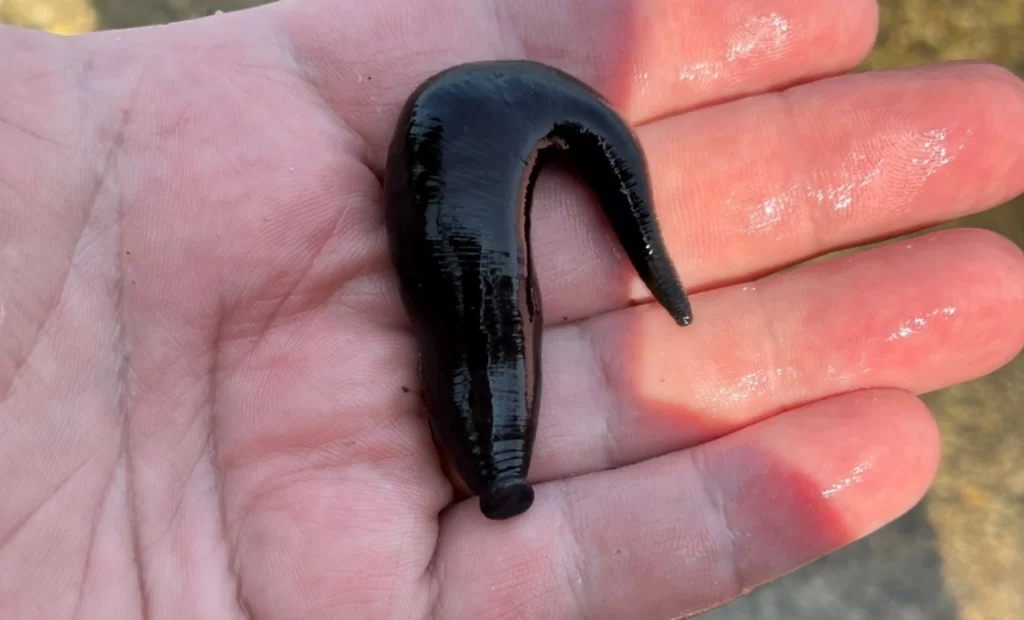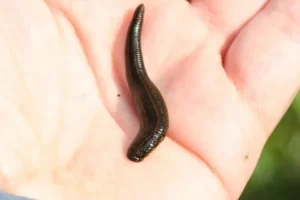Leeches are indeed those monstrous slimy creatures so often characterized as a parasitic creature, yet when sprinkled with salt, interestingly, leeches shrivel up and die. But why does this happen? To really get an answer we have to understand the biology of a leech and see just what happens with satin its body.
Leeches and Their Special Biology
Leeches are segmented worms with dwelling in freshwater and saltwater. Most of the leeches still tend to prefer fresh water. Leeches have bodies that are ringed, which it uses in its ability to move through contraction and expansion, and they breathe through their skin, requiring moisture in order to exist and be active.
Leeches are blood feeders, but they do their feeding off other animals. They attach themselves to their host by means of suckers that are at both ends of their body. Having fed into the skin with their sharp jaws.
The leeches use anticoagulants found in their saliva, maintaining the continuous flow of the blood while it feeds. However, their survival depends much more on their requirement for moisture, and it is salt that plays a big role in that area.
How Salt Affects Leeches
Leeches are soft, moist-skinned animals and need to stay wet to breathe and maintain internal balance. They can only survive in a wet or moist environment because they lose water rapidly through the skin.
Osmosis
When you apply salt to the leech, the salt initiates a process called osmosis. In this case, Salt creates a high concentration outside the leech’s body, and the water inside the leech tries to flow out through its skin to balance the concentration. This quick loss of water essentially dehydrates the leech.
Without much water, its cells shrink, and the body of the leech begins to dry up. When the water is drained from the body, it cannot carry on; in a short time, the leech dies from severe dehydration.
The Role of Osmosis in Death of Leeches
Osmosis is critical in the death of the leech as exposed to salt. That is, if you want to put it simply again: leeches are living creatures just like any other; they must maintain this balance within their cells of water. Without this balance cells can’t work.
When you sprinkle salt on a leech you disrupt that balance. The concentration of water becomes immensely higher inside the leech than outside. Due to this imbalance, water tends to leave quickly and so the leech is dried out and dies.
The whole process occurs within seconds. Salt is highly potent in extracting water from the leech body; consequently, leeches depend mainly on water, hence it cannot survive with the salt, and thus leads to a sudden death.
Why Can’t Leeches Survive Salt?
Leeches adapted in environments with relatively stable levels of moisture. Their skin is semi-permeable, taking in oxygen and expelling carbon dioxide. Because of those properties, leeches have to stay wet. They do not have any biological adaptation to cope with the extreme effects salt causes.
This is the reason why leeches avoid saltwater in nature. Their body systems are not designed to function appropriately regarding dehydration as caused by the effects of salt at the cell level. Freshwater leeches are the ones most susceptible to this because they have not built defense mechanisms against salt.
There are other animals, such as marine animals, which have other forms of adaptation to the sea, permitting them to live with salty surroundings. Animals in the ocean are able to control their intake and hold salt inside their bodies so that a proper water balance would be attained. Not having this adaptation, leeches would prove fatal even to the smallest exposure to salt.
Leeches and Salt Sensitivity
Being leeches, they have sensitive skin and conduct all their bodily functions. They are extremely sensitive to salt. Skin of a leech is thin and permeable hence; it makes it easy to allow the water to enter and leave the organ.
It lives in a freshwater environment and makes this ability of absorbing water only to later release it that makes this animal thrive on. However, it makes sense if it encounters something like salt since its skin penetration will not help it now.
The salt leads to an osmotic imbalance, compelling water to rush out from their cells. Unlike other creatures whose bodies can regulate the amount of water lost, leeches lose water fast. This explains why salt is so deadly to them even in very small amounts.
Is Salt Fatal to Other Animals?
Yes, salt does indeed have the same effect on other animals, although not all are as sensitive as the leeches. Slugs and snails, which are relatives of leeches, also die when sprinkled with salt for similar reasons. The same is true for those creatures with moist, permeable skin; this lets water leave the body when salt is present.
The impact of salt to other animals depends on their capacity to regulate their water and salt balance. We, and most terrestrial animals, are less sensitive to salt, but we are vulnerable to salt when we have been exposed too heavily to it, which dehydrates us. We tolerate salt much better than leeches because our water and salt management is a little more complicated.
Conclusion
Leech dies from salt because of rapid osmosis. Their bodies require moisture to survive, thus salt makes them lose water very fast. Because when the cells are losing water, then the leech dehydrates and after some time, it dies.
This sensitivity to salt has something to do with their biology, particularly with their very thin, permeable skin that cannot really protect them from extreme dehydration. Though leeches thrive with moisture, they can’t handle salt; therefore, they are extremely sensitive to it.
The final point the lethal effect of salt exhibits on leeches is how survival is contingent upon a proper water balance. Familiarization with the process expedites the understanding of not only why it kills the leeches when exposed to salt but also the vital role of water in all living organisms.
We offer the best leeches at our Bulk premium leeches Supplier. Buy in bulk at wholesale prices and with the best customer services.





